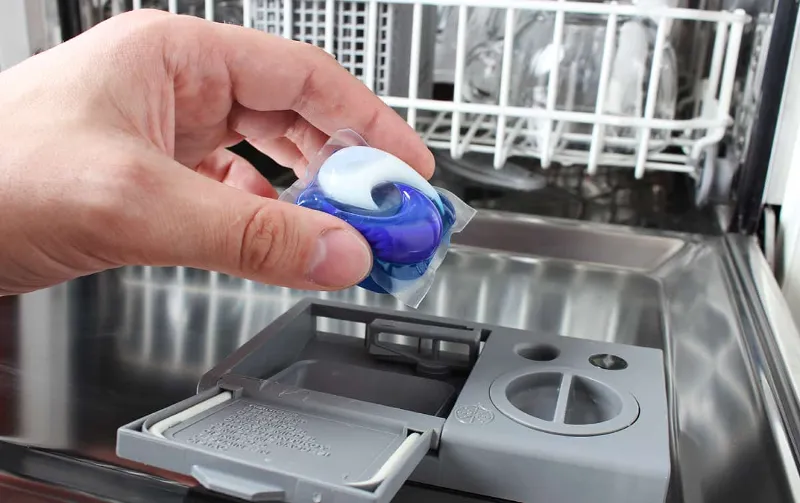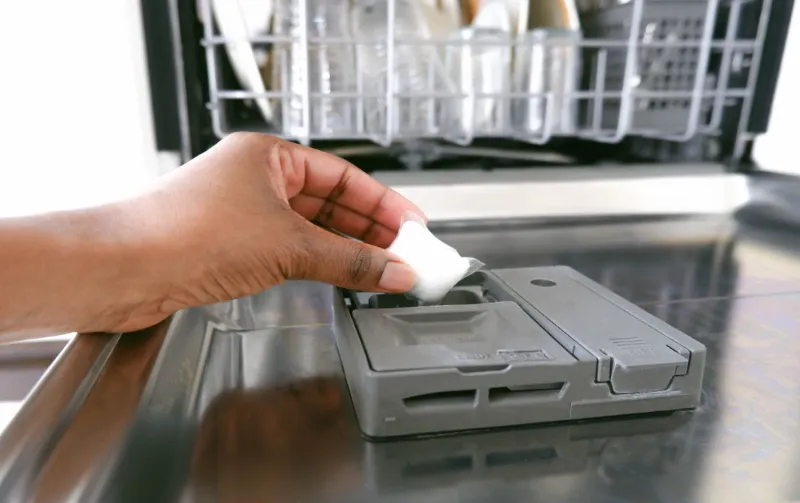Dishwasher pods dissolve in water, releasing detergents that clean dishes efficiently. They contain concentrated cleaning agents for effective dishwashing cycles.
Selecting the right dishwasher detergent is crucial for spotless kitchenware, and dishwasher pods have simplified this task.
These compact, premeasured packets are designed to eliminate the guesswork and mess associated with traditional powders and gels.
Simply toss one into your dishwasher’s detergent chamber, and it does the rest.
The pod’s outer film is water-soluble and environmentally friendly, dissolving quickly upon contact with water.
Inside, powerful enzymes and cleaning agents burst out, tackling stubborn food residue and grease.
Dishwasher pods make the dish-cleaning process hassle-free, delivering the perfect dosage of detergent every time for sparkling results.
Their convenience and efficiency have made them a popular choice in modern households.

The Evolution Of Dishwashing
The journey from scrubbing plates over a sink to loading a machine and simply pushing a button has reshaped the landscape of domestic labor. The Evolution of Dishwashing has not only transformed how we clean our dishes but has also influenced kitchen designs and sustainability practices. Let’s delve into the pivotal moments in this journey and understand how modern innovations like dishwasher pods make the task even more efficient.
History Of Manual Dishwashing
Dishwashing, as a domestic task, has roots deeply embedded in human history.
Before the advent of modern appliances, cleaning dishes was a manual, often communal chore, which involved:
- Soaking dishes in basins of hot, soapy water
- Scrubbing with brushes or cloth
- Rinsing with clean water
- Drying with towels or air drying.
Historical methods were labor-intensive and time-consuming, but they remained the standard until technology paved the way for automated solutions.
Early innovations ranged from mechanical hand-cranked devices to the first electric dishwashers, which were a luxury few could afford.
Introduction Of Dishwasher Pods
The game changer in the world of dishwashing was the introduction of dishwasher pods.
These compact, convenient packets transform the dishwashing experience:
| Advantages of Dishwasher Pods |
|---|
| Pre-measured, eliminating guesswork |
| Easy to handle without messy spills |
| Composed of concentrated detergent for efficient cleaning |
| Often include rinse aids and other additives for superior results |
Dishwasher pods appeared on the market as a revolutionary progression from traditional powders and gels, encapsulating powerful cleaning agents in a water-soluble film.
When introduced into the moist environment of a dishwasher cycle, the film dissolves, releasing the pod’s contents to attack food residue, grease, and stains with unmatched precision.
With continued innovation and growing environmental consciousness, the latest dishwasher pods are designed to be even more effective and eco-friendly.
They incorporate enzymes and other biodegradable elements that excel at cleaning without leaving harmful residues.
The Science Behind Dishwasher Pods
The brilliance of modern convenience is often found in the smallest of packages—take dishwasher pods, for example.
But what really happens once the dishwasher door closes and these compact wonders take to the stage?
The science behind dishwasher pods reveals a choreography of chemistry and engineering designed to tackle the toughest of food remnants with ease.
Composition Of Dishwasher Pods
Dishwasher pods are a marvel of cleaning power, crafted with a specific blend of ingredients to ensure dishes emerge spotless. Let’s unpack these ingredients:
- These molecules are the grease-fighting warriors, reducing surface tension and prying grime away from dishes.
- Starch-dissolving amylases and protein-busting proteases target food residues, breaking them down into simpler forms.
- For stains that cling a bit too fondly to your ceramics, bleach comes to the rescue, oxidizing and disarming these blemishes.
- Assess the water quality and act accordingly, softening hard water to enhance the cleaning efficacy.
A close examination reveals this blend is encased in a biodegradable film, often polyvinyl alcohol (PVOH), which dissolves rapidly upon contact with water.
Mechanism Of Action
At the start of a wash cycle, dishwasher pods begin their task. The dance commences in three acts:
- As the water fills the dishwasher, the PVOH film melts away, liberating the detergents into the aqueous battlefield.
- Surfactants weave through the water, spreading their influence and making contact with residue on every dish.
- Enzymes actively break down complex food particles, while bleach whisks away stains, and builders condition the water.
Aided by the dishwasher’s heat and jets, these components unite to leave your dishware impeccably clean.
Imagine every pod as a self-contained unit, primed to optimize the dynamic environment of your dishwasher.
Benefits Of Using Dishwasher Pods
Discover the array of benefits of using dishwasher pods that may make you rethink your traditional dishwashing routine.
From their effortless operation to their environmental merits and potent cleansing abilities, these pods encapsulate a high-tech solution to dishware maintenance.
Convenience Of Use
Dishwasher pods deliver unmatched ease of use, streamlining your kitchen chores significantly.
Here’s why convenience shines with these compact powerhouses:
- Pre-measured doses eliminate the guesswork and potential mess associated with liquid or powder detergents.
- No fumbling with large boxes or bottles—just grab a pod and go.
- Space-saving packaging means more room in your cabinets.
- Single-use pods prevent the risk of spilling or over-pouring detergent.
Environmental Impact
Many manufacturers are mindful of dishwasher pods’ environmental footprint. Initiatives include:
| Feature | Benefit |
|---|---|
| Biodegradable Ingredients | Helps reduce potential harm to ecosystems. |
| Concentrated Form | Less product needed for each wash, reducing manufacturing demands. |
| Recyclable Packaging | Minimizes plastic waste ending up in landfills. |
| Phosphate-Free Formulas | Decreases the risk of water pollution. |
Superior Cleaning Power
Superior cleaning power is a hallmark of dishwasher pods.
Thanks to advanced technology and formulation, these pods:
- Contain powerful enzymes that break down stubborn food remnants.
- Feature grease-fighting agents for spotless and sparkling results.
- Provide a precise combination of detergents and rinse aids for a streak-free finish.
- Offer multi-phase cleaning, dissolving at different stages of the wash cycle for optimum efficacy.
Moreover, these benefits lead to cleaner dishes with less water and energy consumption, as dishwasher pods enhance the efficiency of modern dishwashers.
Experience transformative cleaning with every cycle!
Tips For Using Dishwasher Pods Effectively
Tackling the task of dishwashing can become more efficient and effective when using dishwasher pods.
These concentrated packets of cleaning power deliver a convenient punch to dirt and grime, but only when used correctly.
To harness their full potential, it’s crucial to follow some essential tips for using dishwasher pods effectively.
With proper technique, you can ensure spotlessly clean dishes every time you run your dishwasher.
Proper Loading Of Dishwasher
A dishwasher’s performance is highly dependent on how dishes are arranged inside. Keep these points in mind for optimal cleaning:
- Give your dishes ample space to ensure water and detergent can reach every surface.
- Ensure that items are facing the center and are not nesting, as this can prevent water from circulating.
- To prevent them from falling and potentially blocking the spray arm or dispenser.
The Right Dishwasher Pod
Selecting the right pod makes a significant difference. Consider these factors:
| Feature | Description |
|---|---|
| Detergent Type | Choose a formula that suits your needs, whether it’s for hard water conditions or ensuring a phosphate-free clean. |
| Pod Size | Match the pod size to your dishwasher model and the load’s soil level – smaller for light loads, larger for heavy-duty cleaning. |
| Eco-friendliness | For the environmentally conscious, look for pods with biodegradable ingredients. |
Ensuring Optimal Water Temperature
To activate the cleaning agents in dishwasher pods, the right water temperature is essential:
- Check your dishwasher’s manual to find the recommended water temperature, typically between 120°F and 160°F.
- Run hot water at the sink near your dishwasher before starting the cycle, ensuring the dishwasher starts with hot water.
- Maintain your hot water heater, setting it appropriately to deliver consistent, sufficient hot water for your dishwasher.

Troubleshooting Common Issues With Dishwasher Pods
Dishwashers are a marvel of modern home convenience, and dishwasher pods have become a popular choice for their ease of use and effectiveness.
However, users sometimes face operational hiccups with these pods.
Residue Or Film On Dishes
Discovering a residue or film on your clean dishes can be frustrating.
This can occur if the dishwasher pod doesn’t fully dissolve, or due to the use of too many additives.
- Ensure that the spray arms and filters are not clogged. Clean them regularly to prevent blockages that might stop water from reaching the pod effectively.
- Try using a dishwasher cleaner to remove any build-up inside the machine that could prevent the pod from dissolving.
- Consider reducing the amount of detergent or using a pod with a rinse aid function for a better finish.
Pod Not Dissolving Properly
When the pod doesn’t dissolve, it’s usually a sign that water isn’t being released at the correct temperature or pressure.
- Check that the water temperature is hot enough, ideally around 120-160°F (49-71°C).
- Run the hot water in your sink before starting the dishwasher to ensure that hot water is available from the start of the cycle.
- Ensure that the pod is placed in the dispenser properly and that the dispenser door is not obstructed.
Dealing With Hard Water Issues
Hard water can reduce the efficacy of dishwasher pods, leaving dishes spotty and not completely clean.
High mineral content in water can inhibit the pod’s dissolving process.
| Method | Benefits |
|---|---|
| Use a water softener | Reduces mineral content in water before it enters the dishwasher. |
| Add a rinse aid | Helps to break down the minerals in the water. |
| Vinegar rinse | An eco-friendly option that can remove lingering spots and film. |
For a quick fix, place a small bowl filled with white vinegar on the top rack during your washing cycle.
The vinegar will help to break down the minerals and aid in the dishwasher pod’s performance.
Frequently Asked Questions On How Do Dishwasher Pods Work
How Do Dishwasher Pods Improve Cleaning?
Dishwasher pods contain concentrated detergent that effectively breaks down food debris and grease, providing an optimal clean without pre-rinsing dishes.
What Ingredients Are In Dishwasher Pods?
Dishwasher pods usually consist of enzymes, bleach, surfactants, and a water-soluble casing, combining powerful cleaning agents for a thorough wash.
Are Dishwasher Pods Safe For All Dishwashers?
Most dishwasher pods are universally compatible with modern dishwashers, but always check the manufacturer’s recommendations for optimal results.
Can Dishwasher Pods Dissolve Completely?
Yes, dishwasher pods are designed to dissolve fully in water, releasing their contents during the wash cycle for efficient cleaning performance.
Conclusion
Understanding dishwasher pods is key to a cleaner kitchen. These concentrated packets combine powerful cleaners in a precise dose.
They’re convenient and effective, breaking down stubborn food and stains.
For sparkling dishes, every wash, and pods are your go-to choice. Embrace this simple solution for spotless results.
